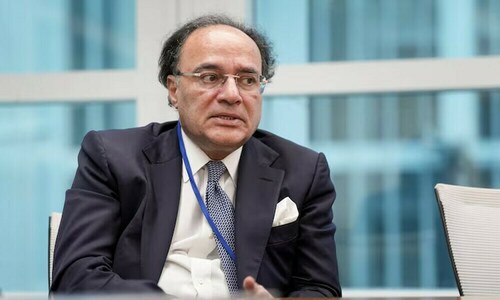Ensuring Petroleum Stockpiles Amid Geopolitical Tensions
ISLAMABAD: The government will guarantee sufficient reserves of petroleum products nationwide, considering geopolitical tensions and Middle Eastern regional developments, according to Finance Minister Muhammad Aurangzeb on Tuesday.
Senator Muhammad Aurangzeb officiated as the Chief Guest at the “National Workshop on Transitioning to Defined Contribution Pension Schemes.” The Securities and Exchange Commission of Pakistan (SECP) hosted the workshop at a local hotel on Tuesday.
The Finance Minister asserted Pakistan’s readiness to manage any possible consequences of regional instability.
Addressing Economic Implications
In his main address, the Minister updated attendees on recent geopolitical tensions and regional events. He shared perspectives from a high-level meeting he led the day before to examine the evolving situation and its potential economic effects on Pakistan.
He mentioned detailed discussions with vital stakeholders on planning for different scenarios, guaranteeing adequate petroleum product reserves, and monitoring asset class pricing. He underscored the government’s firm determination and readiness to manage any situation, stating, “We are in a good place — but hope is not a strategy. We have to plan for every possible outcome.”
International Economic Relations
Senator Aurangzeb discussed global economic developments, including his encouraging conversation with the US Commerce Secretary the previous evening. He described the ongoing US tariffs discussions as promising, noting that both countries are steadily progressing, with the broader goal of strengthening bilateral relations into a strategic economic alliance.
Government’s Reform Agenda
The Minister highlighted the government’s reform agenda, as detailed in the recent federal budget, reaffirming its commitment to macroeconomic reforms. He emphasised the government’s continued focus on key areas such as privatization, tax reform, state-owned enterprise (SOE) restructuring, federal government rightsizing, pension, and public finance reform.
Pension Reforms
Senator Aurangzeb addressed pension reforms, explaining the rationale behind transitioning new civil servants to a Defined Contribution (DC) pension scheme, starting July 1, 2024. He stressed that this move was crucial, preceding the resolution of unfunded pension liabilities. “We had to stop the bleeding,” he stated, referring to the fiscal strain of pension payments, which now exceed one trillion rupees—surpassing the entire federal government’s development budget. “This raises a fundamental question of macroeconomic sustainability,” he added, highlighting the reform’s urgency.
The Minister also acknowledged provincial governments for their proactive role, especially in public-private partnerships and leading defined contribution initiatives. He noted the workshop’s theme—transitioning to defined contribution schemes—was timely and significant, comparing it to ongoing tariff reforms in its structural importance.
Senator Aurangzeb concluded by expressing confidence in stakeholders’ collective ability to bring about significant change in Pakistan’s pension system, driven by sustainability, transparency, and long-term fiscal responsibility.
Finance Minister emphasized the pressing requirement for pension reform, pointing out the unsustainability of the current defined benefit system.
SECP Chairman Akif Saeed detailed the progress in creating a strong regulatory framework for DC pension schemes. He emphasised the vital role of technology, transparency, and awareness in shaping a modern, inclusive pension landscape.
Federal and provincial government representatives provided updates on reform progress, with Khyber Pakhtunkhwa sharing valuable insights from its early implementation.
The workshop facilitated dialogue among senior officials, regulators, financial sector leaders, and development partners. The SECP reaffirmed its dedication to collaborating with all stakeholders to develop a transparent, reliable, and future-ready pension system that promotes long-term financial security and inclusion.



Comments (0)
No comments yet. Be the first to comment!
Leave a Comment